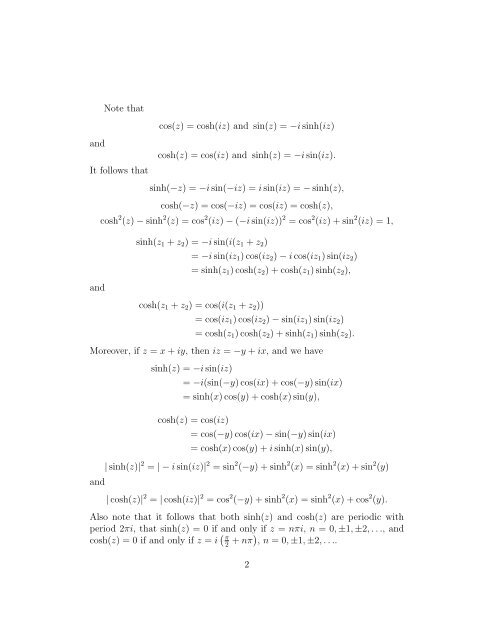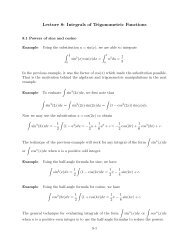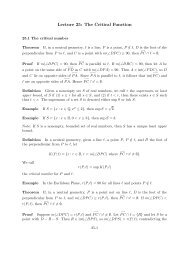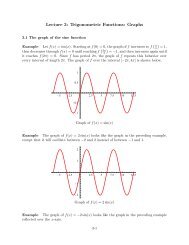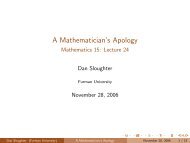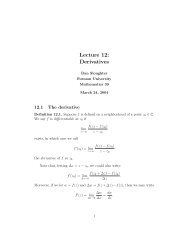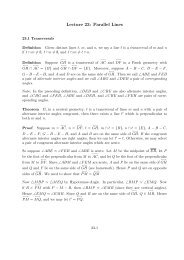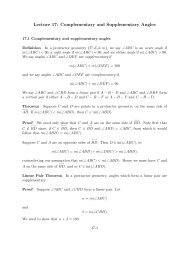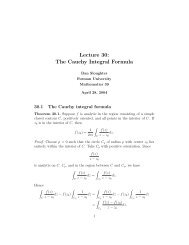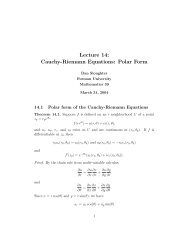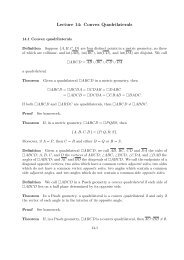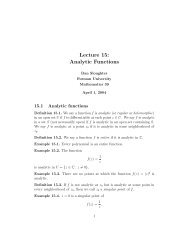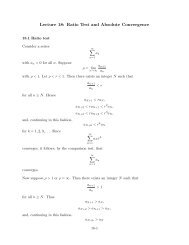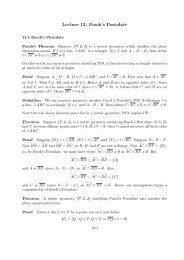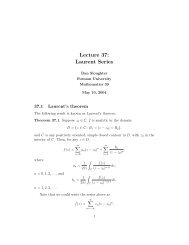Lecture 21 Hyperbolic Functions
Lecture 21: Hyperbolic Functions - Furman University
Lecture 21: Hyperbolic Functions - Furman University
You also want an ePaper? Increase the reach of your titles
YUMPU automatically turns print PDFs into web optimized ePapers that Google loves.
Note that<br />
cos(z) = cosh(iz) and sin(z) = −i sinh(iz)<br />
and<br />
It follows that<br />
cosh(z) = cos(iz) and sinh(z) = −i sin(iz).<br />
and<br />
sinh(−z) = −i sin(−iz) = i sin(iz) = − sinh(z),<br />
cosh(−z) = cos(−iz) = cos(iz) = cosh(z),<br />
cosh 2 (z) − sinh 2 (z) = cos 2 (iz) − (−i sin(iz)) 2 = cos 2 (iz) + sin 2 (iz) = 1,<br />
sinh(z 1 + z 2 ) = −i sin(i(z 1 + z 2 )<br />
= −i sin(iz 1 ) cos(iz 2 ) − i cos(iz 1 ) sin(iz 2 )<br />
= sinh(z 1 ) cosh(z 2 ) + cosh(z 1 ) sinh(z 2 ),<br />
cosh(z 1 + z 2 ) = cos(i(z 1 + z 2 ))<br />
= cos(iz 1 ) cos(iz 2 ) − sin(iz 1 ) sin(iz 2 )<br />
= cosh(z 1 ) cosh(z 2 ) + sinh(z 1 ) sinh(z 2 ).<br />
Moreover, if z = x + iy, then iz = −y + ix, and we have<br />
and<br />
sinh(z) = −i sin(iz)<br />
= −i(sin(−y) cos(ix) + cos(−y) sin(ix)<br />
= sinh(x) cos(y) + cosh(x) sin(y),<br />
cosh(z) = cos(iz)<br />
= cos(−y) cos(ix) − sin(−y) sin(ix)<br />
= cosh(x) cos(y) + i sinh(x) sin(y),<br />
| sinh(z)| 2 = | − i sin(iz)| 2 = sin 2 (−y) + sinh 2 (x) = sinh 2 (x) + sin 2 (y)<br />
| cosh(z)| 2 = | cosh(iz)| 2 = cos 2 (−y) + sinh 2 (x) = sinh 2 (x) + cos 2 (y).<br />
Also note that it follows that both sinh(z) and cosh(z) are periodic with<br />
period 2πi, that sinh(z) = 0 if and only if z = nπi, n = 0, ±1, ±2, . . ., and<br />
cosh(z) = 0 if and only if z = i ( π<br />
2 + nπ) , n = 0, ±1, ±2, . . ..<br />
2


